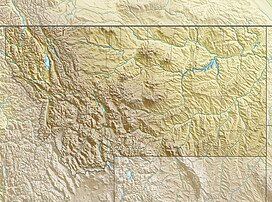Mount James (9,380 feet (2,859 m)) is located in the Lewis Range, Glacier National Park in the U.S. state of Montana.[1][3] Mount James is 1.35 miles (2.17 km) northeast of Triple Divide Peak. The Blackfeet name for the mountain is Ah'-kow-to-mak-an (Double Runner).[4]
| Mount James | |
|---|---|
| Highest point | |
| Elevation | 9,380 ft (2,860 m)[1] |
| Prominence | 1,978 ft (603 m)[1] |
| Parent peak | Rising Wolf Mountain[1] |
| Listing | Mountains in Glacier County, Montana |
| Coordinates | 48°35′04″N 113°29′32″W / 48.58444°N 113.49222°W[2] |
| Geography | |
| Location | Glacier County, Montana, U.S. |
| Parent range | Lewis Range |
| Topo map | USGS Cut Bank Pass, MT |
Geology
editLike the mountains in Glacier National Park, Mt. James is composed of sedimentary rock laid down during the Precambrian to Jurassic periods. Formed in shallow seas, this sedimentary rock was initially uplifted beginning 170 million years ago when the Lewis Overthrust fault pushed an enormous slab of precambrian rocks 3 mi (4.8 km) thick, 50 miles (80 km) wide and 160 miles (260 km) long over younger rock of the cretaceous period.[5]
- ^ a b c d "Mount James, Montana". Peakbagger.com. Retrieved December 26, 2018.
- ^ "Mount James". Geographic Names Information System. United States Geological Survey, United States Department of the Interior. Retrieved December 26, 2018.
- ^ Cut Bank Pass, MT (Map). TopoQwest (United States Geological Survey Maps). Retrieved December 26, 2018.
- ^ Shultz, James Willard (1916). Blackfeet Tales of Glacier National Park. Boston: Houghton Mifflin. p. 108.
- ^ Gadd, Ben (2008). "Geology of the Rocky Mountains and Columbias".
{{cite journal}}: Cite journal requires|journal=(help)
Climate
editBased on the Köppen climate classification, Mt. James is located in an alpine subarctic climate zone characterized by long, usually very cold winters, and short, cool to mild summers.[1] Temperatures can drop below −10 °F with wind chill factors below −30 °F.
See also
editReferences
editThis section is empty. You can help by adding to it. (February 2024) |
External links
edit- Flickr photo: Mount James
- Mount James weather: Mountain Forecast
- ^ Peel, M. C.; Finlayson, B. L.; McMahon, T. A. (2007). "Updated world map of the Köppen−Geiger climate classification". Hydrol. Earth Syst. Sci. 11 (5): 1633–1644. Bibcode:2007HESS...11.1633P. doi:10.5194/hess-11-1633-2007. ISSN 1027-5606. S2CID 9654551.

